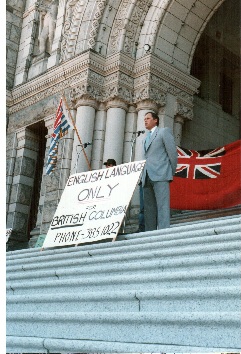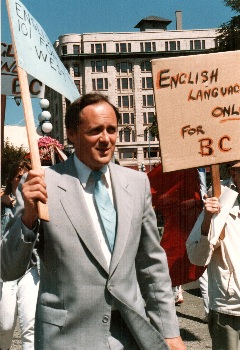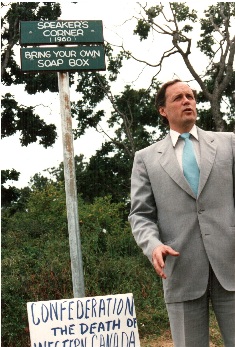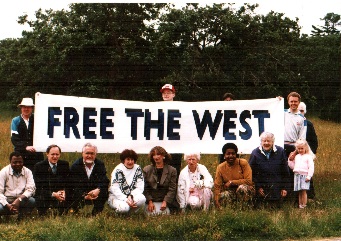A BRIEF HISTORY OF THE
WESTERN CANADA CONCEPT
The Western Canada Concept really began with a letter to the editor which was written by Douglas Christie and published in the
Victoria Colonist in 1975.
This letter resulted in the formation of a movement called the Committee for Western Independence whose motto was "Separation if necessary, but not necessarily separation." The alternative espoused was a regionally-elected Senate with power equal to the House of Commons and powers of appointment to the Supreme Court of Canada.
The Committee for Western Independence was folded into the Western Canada Concept which simply seeks an independent nation of Western Canada by political means (a referendum in each province). This was the result of realizing that the nation of Canada is so arranged that the parts which would lose by such a reform (i.e. Ontario and Quebec) will never approve of substantial reform to their disadvantage yet their approval is necessary to achieve it.
Thus by 1980, the Western Canada Concept was founded in the realization that reform in Canada is really impossible.
The Western Canada Concept was launched by a speaking tour of Western Canada in 1980 just as Doug Christie had launched the Committee for Western Independence in 1978. Every city of Western Canada had a public meeting; members joined everywhere.
The party grew dramatically until it held a rally on November 20, 1980 after the National Energy Policy was announced by the Trudeau government which effectively expropriated Western Canada’s oil resources.
The rally on November 20, 1980 in the Jubilee Auditorium was attended by over 2,800 people and drew national attention as did a subsequent one in the Jubilee Auditorium in Calgary on December 8, 1980. At this time, the federalists became aware of the dangers of separation and their media agents began their attack.
The party continued to grow until it formed autonomous provincial wings which thereafter took part in provincial politics and began in-fighting. The process of provincial in-fighting hurt the party and soon Mr. Christie had to start all over again with the Western Canada Concept as a national movement. "National" in this context refers to Western Canada.
From 1982 to 1995, the Western Canada Concept has been a slowly growing movement of Western Canadians whose primary focus has been not in provincial politics, but on a national (Western Canadian interprovincial) level. This was accomplished with public meetings and the Western Separatist Papers, published monthly and distributed throughout Western Canada.
--------------------------------------------------------------------------------
About the Western Separatist Papers
This newsletter was started in September 1983 by Keltie Zubko and had as its aim to publish the "papers" about Western Canada that were created by members of a Western Canada Concept study group. It has continued to be published monthly and is now the newsletter for the Western Canada Concept party.
Our website contains an archive of several years of back issues, accessible at the
Western Separatist Papers Index.
--------------------------------------------------------------------------------
The Letter to the Editor that started it all:
"Western Canada exploited"
To the Editor:
The movement recently among people in western Canada to demand a fair equity for resources located here has apparently been unsuccessful.
Alberta, to prevent the complete breakdown of the oil industry, has deferred to the demands of the central government who need these resource revenues to buy votes in the East. This, of course, could not be the case if these revenue producing resources were located in eastern Canada (particularly Quebec) and I would like your readers to consider why this is so.
The primary reason the British North America Act can now be disregarded by the Trudeau government is the fact of Ontario’s present 88 seat representation and Quebec’s 74 seat representation, with Manitoba, Saskatchewan, Alberta and B.C. having a total of 68 seats. This is a present fact of power which above all else makes exploitation of the West a political possibility.
Secondly, the media of communication, for reasons best known to themselves, concentrate their attention either on the acts and words of Trudeau or on the danger of dissidence from Quebec.
This comment is most directed to the CBC whose government sponsorship lends it the aura of legitimacy and the ability to propagandize at the public expense. The result of this fact is the inability of the West and by that I mean Manitoba, Saskatchewan, Alberta and B.C. to see itself as an economically viable political unit.
Thirdly, bureaucratic empire-building by governmental agencies directly or indirectly funded from Ottawa tends to support the contention that nothing is possible unless the civil servants say it is so.
A large segment of western Canadians have become indifferent to their future out of a sense of frustration with government as a whole.
They fail to realize that although their representation is inadequate to the task, they could if united become a powerful political force because the West is infinitely valuable and in fact essential to eastern affluence and its value is directly proportionate to its unexhausted but rapidly depleting natural resources. This political power therefore will not last forever.
The problem is to awaken western Canadians to this situation and bring to bear the collective aspiration for fairness and efficiency in government. The method must be a realization of the freedom of the individual to associate and express his views in the democratic manner.
This letter is written in the hope that a few will awaken to their rights and form an association to unify and strengthen the voice of western Canada. those who would like to, are invited to write to me.
Douglas H. Christie
Victoria, B.C.
(This letter was written on December 24, 1974 and it appeared in the
Victoria Colonist in January 1975. Its publication called forth a small group of people who formed the Committee for Western Independence, the predecessor of the Western Canada Concept.)
--------------------------------------------------------------------------------
Commentary on the Early History of the Movement
From the Western Separatist Papers of February 1985, this article obviously only covers the period up to February of 1985. Further history will follow.
A Separatist Speaks
by Douglas Christie
So many times I read commentaries and alleged histories of the Western Separatist Movement which are inaccurate, that I'd like to set some of it straight by the following.
In December 1974 I wrote a letter to the Editor of the Victoria Colonist, citing the inequities of the West in Canada, and with this letter, founded the Committee for Western Independence. People wrote to me, because they could see there was no other solution to what was then the export tax on oil. Now, in 1985, we can see that nothing has changed, only gotten worse.
The Committee for Western Independence in early 1975 gained members from around the province of B.C. That same year and in the few years following, I held meetings in Alberta with John Rudolph and Milt Harradence who were involved in the Independent Alberta Association.
In July of 1978, amid fanfare from the media and people in 27 cars, the first Independence Caravan set out on a tour of the West. Two vehicles went the full distance of the long, hot road that summer.
By doing this, I developed an awareness of the common bonds of Western Canadians, and built up a network of contacts which had the same goal of Independence for the West. The people who believed in this aim were and are scattered all over the prairies, and throughout the mountains of B.C., those vast spaces one has to travel to believe. Meetings in Penticton, Kelowna, Vernon, Calgary, Medicine Hat, Lethbridge, Regina, Brandon, Winnipeg, Yorkton, Saskatoon, Prince Albert and the Metis meeting at Batoche were all part of the tour, as well as at Edmonton, Red Deer, Prince George, Kamloops and Vancouver -- all these led to a growth in Western Separatism.
The year 1979 brought the election for the six months of Joe Clark; some of the internal operations of the movements for Western Independence ceased, just as they did following the election of Brian Mulroney.
In February 1980, Trudeau was back, and riding high, while Clark was not. The West was isolated, and removed from Liberal representation; it was clear to everyone. There was no political party which at that time represented all of Western Canada with an aim of one nation, one language and one government. So in February of 1980, after a meeting at the Empress Hotel in Victoria, I decided to form a party for all of the West. I chose the name "Western Canada Concept" later that spring and because the Committee for Western Independence had no political status, began to organize across the West. Dode French was the first President.
The future of the W.C.C. seemed assured in the growth of the first tour I made in July of 1980 on behalf of it. Spontaneous growth occurred everywhere (except Brandon, as the media was so fond of pointing Out.) In Edmonton I met Al Opstad who suggested I come back in the fall, for a larger meeting.
In the meantime, in the spring of 1980 Elmer Knutson had started a sort of parallel organization called Westfed which had much the same platform, but was not a political party, and was very unclear on Independence.
In November 1980, I could feel the charged atmosphere in Alberta, and arranged meetings throughout the province. As you remember, the National Energy Policy was announced at the end of October, and with that announcement the people arose!
The Alberta meetings were packed. Edmonton was so enthused that we had two meetings, on the 4th and the 5th. The one on the 5th involved a debate with Martin Hattersley, with an audience of about 600. It was some debate and some audience: There I met Phil May who suggested renting the Jubilee Auditorium for November 20, 1981, and he would see to the promotion. After 10 days of hard work, under Mr. May's very capable guidance, and with great pressure from the media who predicted the meeting would be a failure, the rally was held. Because of it, the W.C.C. was well on the way to shocking the world.
Only the infiltration of subversive forces could later steer us from the clear, popular course of Independence. That fire was fueled by many things, from ambition to confusion and naiveté, and in some cases real malice to the concept itself. It was all part of the experience of growing wise.
The Party in 1980-1981 became heavily weighted in favour of representation from Alberta because of the heightened awareness among Albertans because of the energy program. In May 1981, a Board of Directors of almost exclusively Albertans was elected at the Annual Meeting held in Edmonton. There was no delegate system, so the result was not surprising. I had been so busy traveling and speaking that I had not established a legal structure for the party. On June 15, 1981, the party in Alberta achieved the almost 4,000 signatures it needed, and became registered by the Chief Electoral Officer. The efforts of hundreds of Albertans were required to get these signatures, to do what only 4 signatures had been able to do in British Columbia.
Many people in Alberta in 1981 saw Alberta as their first loyalty; after all, the provincial governments were the only defense between themselves and the pillaging federal government. There was confusion as to how Independence could be achieved for 4 provinces. Much of the problem resulted from innocence, but there was also some deliberate federal subversion. Many new people were very discouraged when they saw me and the party come under vicious attack in the media. We could not answer this attack, through the lack of funds. It took 3 and 1/2 years to achieve some sort of vindication in just one (the worst) incident, involving an article appearing in the Edmonton Sun. In December 1985 I was awarded $30,000 by the Court of Queen's Bench in Alberta, a somewhat late recognition of the general vilification in the media of the time. The party suffered at the hands of the guileful Eastern-owned media of the larger cities of the West.
The party became four parties, one in Manitoba, Saskatchewan, Alberta and B.C. Now, 4 years after that rally on November 20, 1980, some sort of semblance of unity is starting to appear.
Mr. Mulroney, the Eastern answer to Pierre Trudeau, in now bringing about another Western realization of the corruption of the federal system. There is a growing perception that it is not simply a matter of the party, but of the power base. The power base that elected Mr. Mulroney, like his predecessor, was Quebec.
The brief history -- by no means complete -- like the story of Confederation itself, proves nothing has changed. We must continue to unite in the West, to fight off the sickness of our present political constitutional arrangement, with a democratic right of a referendum in each Western province. This was seen as a right for Quebec. Why not the west?
We can offer the only real alternative to a bankrupt Canadian economy. This Western Canadian country, with a regionally representative elected Senate, one language, one government, free trade with the world, ample resources of fishery, forestry, mining and agriculture, would be the richest and most freedom-loving nation of the world.
Do you want to wait until we are a debt-ridden open-pit mine in a third-world government, run from foreign banking interests, to the benefit of a new world order? The choice is yours! The time is now! Free the West: We must join together in this cause of the nation of Western Canada will die and our land and our way of life will die with it. Those who love this land already know this and are working with everything in their power to do something about it.
PHOTOS FROM THE EARLY DAYS
Here are some photographs from the early days of the Western Canada Concept...

Doug Christie stands on the steps of the BC Legislature, proclaiming the benefits of independence.

Doug Christie and other frustrated Westerners protest the exessive costs of bilingualism.

Doug Christie speaks for western independence in Beacon Hill Park.

A group of Sepratists proudly express their beliefs with a giant banner in Beacon Hill Park.
